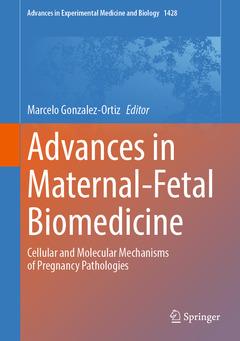Description
Advances in Maternal-Fetal Biomedicine, 1st ed. 2023
Cellular and Molecular Mechanisms of Pregnancy Pathologies
Advances in Experimental Medicine and Biology Series, Vol. 1428
Coordinator: Gonzalez-Ortiz Marcelo
Language: English
Subjects for Advances in Maternal-Fetal Biomedicine:
310 p. · 17.8x25.4 cm · Hardback
Description
/li>Contents
/li>Biography
/li>Comment
/li>
This edited volumeaims to describe physiological and pathophysiological mechanisms that underlie human maternal-fetal interactions. The book emphasizes the structure and development of the fetoplacental unit, the endocrine and nutritional regulation of fetal development, nitric oxide signalling, solute carriers function and ion channels regulation in healthy pregnancies and diseases, like preeclampsia, gestational diabetes, and maternal obesity, among others. Also, we highlight novel mechanisms associated with language impairment in children, the use of serotonin inhibitors or cannabis during pregnancy, and maternal conditions' potential impact on cerebrovascular development in newborns and infants. The cellular and molecular understanding of maternal-fetal physiology and pathophysiology will allow the readers to understand the impact of diseases or conditions that are highly prevalent in pregnant women.




